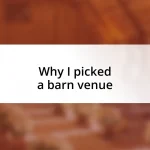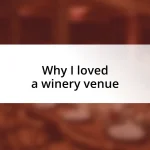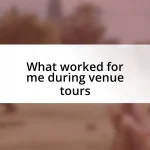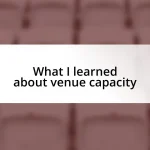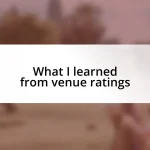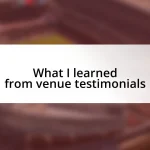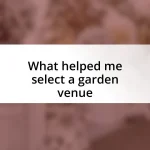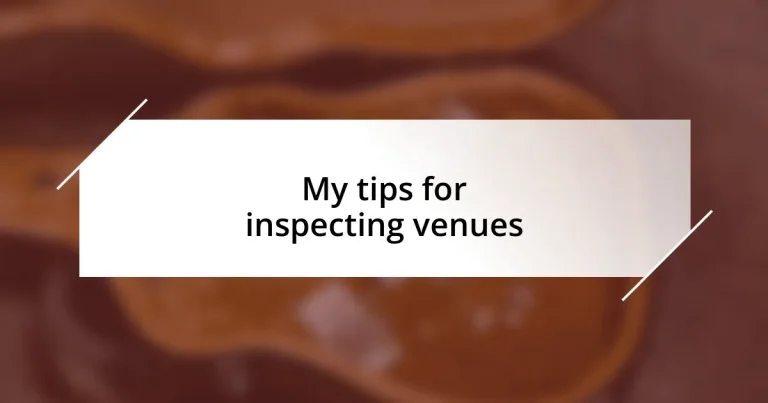Key takeaways:
- Creating a detailed checklist and plan is essential for effective venue inspections, helping to focus on key elements like layout, facilities, and ambiance.
- Evaluating accessibility is crucial; ensure that venues are not only visually appealing but also accommodating for all guests, including those with mobility challenges.
- Engaging with venue staff can provide valuable insights about the venue’s capabilities, maintenance, and logistical support, influencing the overall event success.
- Finalizing your venue choice requires careful review of contracts and alignment with the event’s purpose to ensure a successful outcome.

Understanding Venue Inspection Process
Understanding the venue inspection process can feel a bit overwhelming at first, but it’s definitely manageable with the right approach. I remember the first time I had to inspect a venue for an important event; I felt a mix of excitement and anxiety. What should I look for? What details really matter? By focusing on key elements like layout, facilities, and ambiance, I discovered that breaking it down into smaller tasks made the process less daunting.
During an inspection, having a clear checklist can be a game changer. I once attended a venue that looked perfect in photos, but the reality was quite different. By checking features like accessibility, acoustics, and even restrooms, I realized that what looks good on paper might not meet your expectations in real life. Isn’t it vital to have a reliable benchmark to avoid such surprises?
Lastly, understanding how a venue aligns with your event’s goals is essential. When I visited a space that seemed charming but lacked adequate lighting for presentations, it struck me how pivotal that was for a successful event. Isn’t it important to balance aesthetics with functionality? Your venue should not only captivate but also serve its purpose effectively.
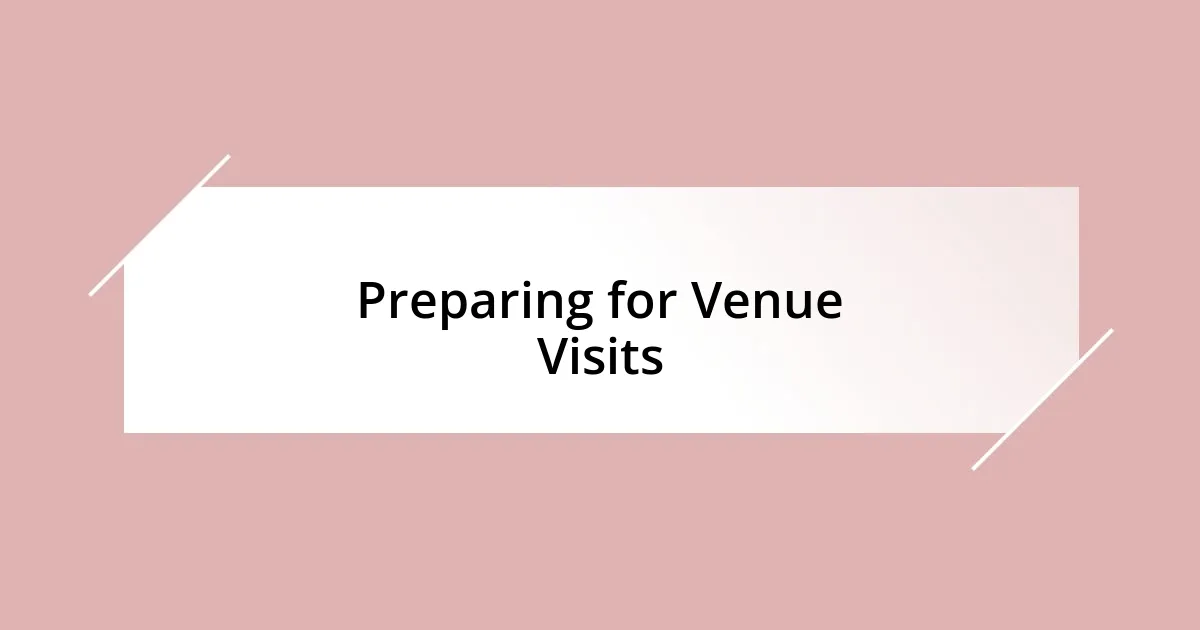
Preparing for Venue Visits
When preparing for venue visits, I find that creating a detailed plan is essential. It not only sets a clear agenda but helps to manage any nerves you might feel. One time, I walked into a venue without a solid plan and ended up feeling lost in the space. I missed critical details that could have influenced my decision. A structured approach keeps things organized and focused.
Here are some tips that work for me when preparing for a venue visit:
- Research the venue: Familiarize yourself with its offerings, layout, and reviews beforehand.
- Define your objectives: Know what you need in terms of capacity, facilities, and overall vibe.
- Create a checklist: List specific aspects to assess, such as parking, amenities, and atmosphere.
- Schedule a walk-through: Allow ample time to explore, taking notes as you go, and capturing first impressions.
- Bring a camera: Document the space for future reference, especially if you’re visiting multiple venues in one day.
I always remind myself that every visit is a learning opportunity, whether it meets my expectations or not. It’s this mindset that turned what could’ve been a stressful task into an exciting adventure. I still recall my last visit to a venue with stunning architecture; despite its beauty, I quickly noticed the lack of sufficient breakout rooms. That realization reinforced why preparation is key—it’s about balancing aesthetics with practical needs.
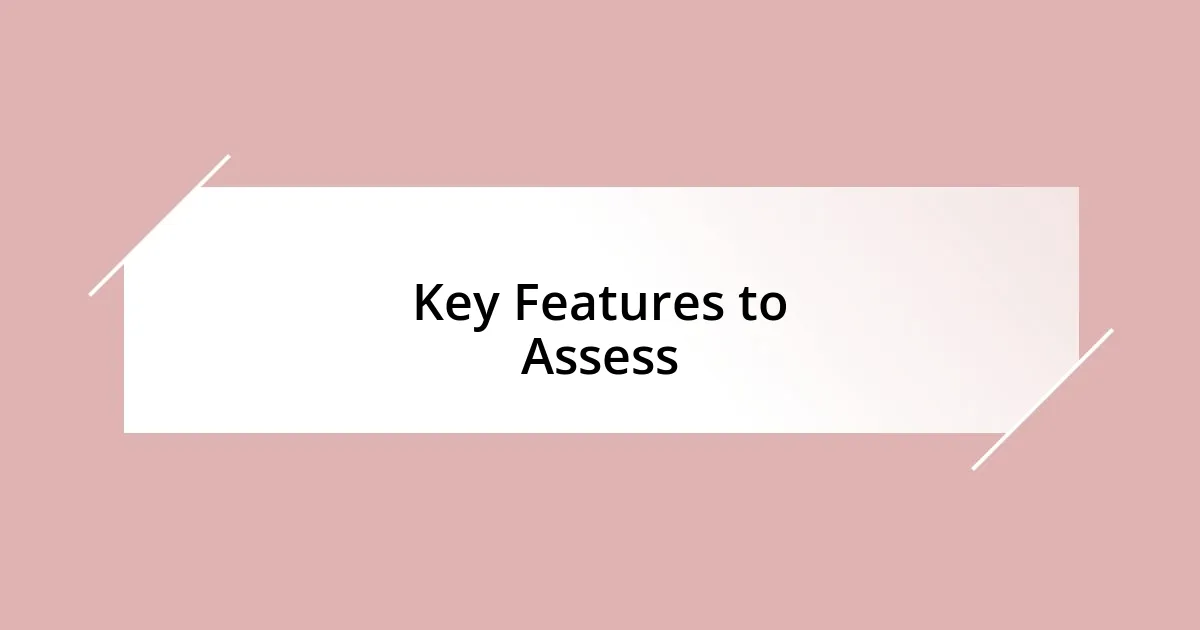
Key Features to Assess
When assessing a venue, it’s crucial to evaluate its layout. I recall inspecting a venue that had an inviting entrance but a confusing floor plan. The layout should facilitate flow and avoid bottlenecks, especially during events with high foot traffic. A well-designed space enhances guest experience, and this is an aspect that often gets overlooked.
Access to facilities is another key feature I always check. I remember a day when I visited a venue with exquisite décor and a vibrant atmosphere, yet the available bathrooms were far too few. Facilities should not only meet the needs of your guests but also provide convenience. Whether it’s adequate restrooms or tech support availability, every detail counts and can significantly impact the event’s success.
Finally, don’t underestimate the power of ambiance. It sets the tone and feels for an event. During one of my inspections, I encountered a venue that was visually stunning but felt oddly sterile due to harsh lighting and a lack of personal touches. The right ambiance can transform an event from ordinary to unforgettable. Consider how a venue’s atmosphere aligns with your event’s theme and message.
| Key Feature | Importance |
|---|---|
| Layout | Ensures smooth flow and easy navigation for guests. |
| Facilities | Meets practical needs and enhances guest convenience. |
| Ambiance | Sets the emotional tone and enhances the overall experience. |
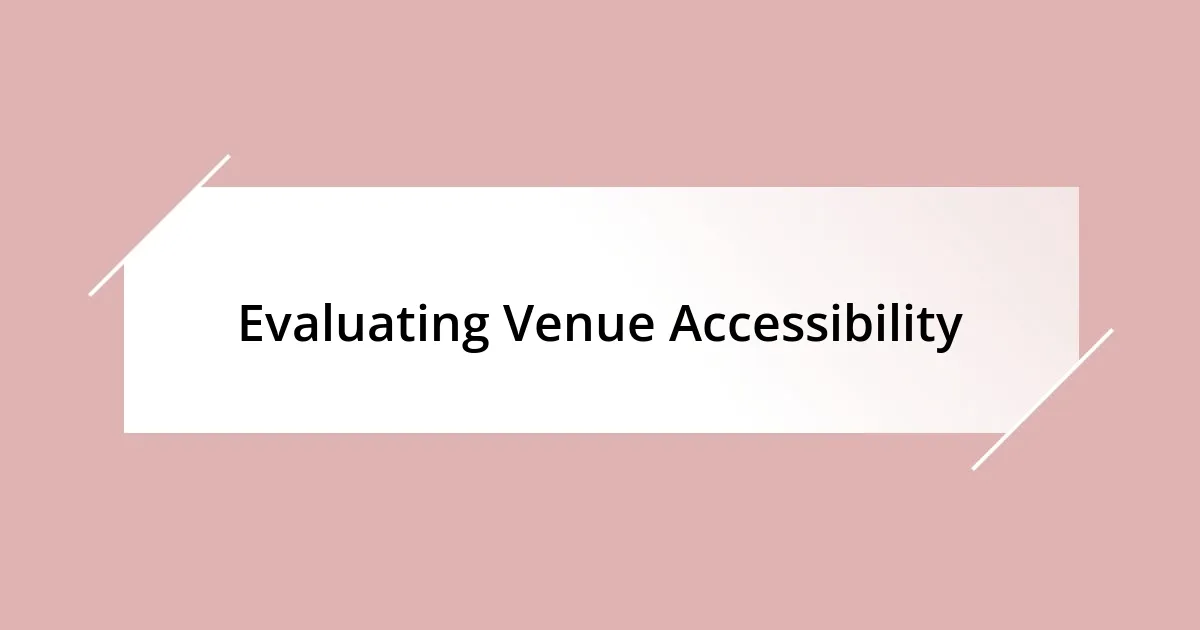
Evaluating Venue Accessibility
Evaluating venue accessibility is a vital step that I never overlook. A memorable experience for me was visiting a venue that boasted gorgeous decor but lacked an accessible entrance. When I saw guests struggling with stairs, it hit me that beauty means little if everyone can’t comfortably enter. Access shouldn’t just be an afterthought; it should be part of the design.
One aspect I always pay close attention to is accessible facilities. I’ve been in situations where restrooms were far from the main areas or not equipped for those with mobility challenges. It’s frustrating for guests and can create a negative impression of the event as a whole. I often ask myself: why risk the comfort of attendees? Ensuring proper accessibility to amenities is not just considerate; it’s essential for an inclusive experience.
I also consider transportation options when evaluating a venue’s accessibility. On one occasion, I aimed for a venue that seemed promising until I realized public transport options were limited and parking was a nightmare. It made me rethink my choice completely. I’ve learned that easy access to transportation makes all the difference. Are we doing enough to ensure all our guests can join in the fun effortlessly? Being proactive about these details truly reflects the thoughtfulness of event planning.
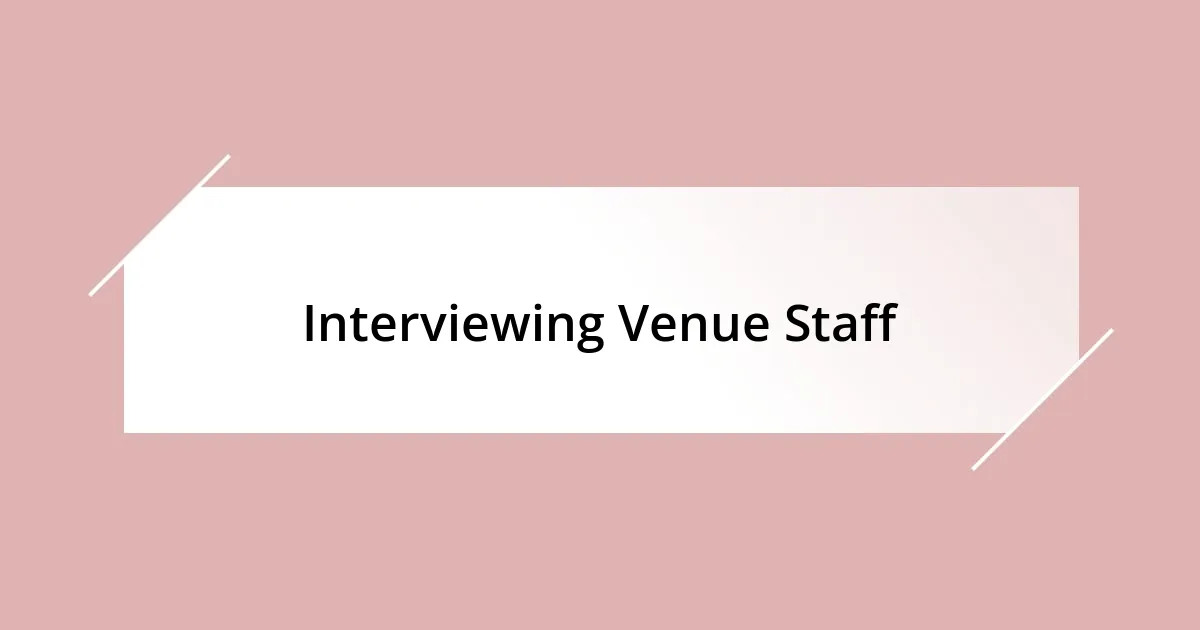
Interviewing Venue Staff
When interviewing venue staff, I find it incredibly insightful to engage in a genuine conversation. On one occasion, I chatted with a venue manager who eagerly shared stories of past events, revealing both the staff’s dedication and the hidden quirks of the space. Their enthusiasm was contagious and made me realize the importance of their firsthand experiences in assessing the venue. What can be learned from staff anecdotes often paints a vivid picture of what the venue truly offers.
I also focus on asking specific questions about logistical support, like how they handle last-minute changes. During my inspection of a popular venue, the staff explained their flexible setup process, which reassured me that they could adapt to various needs. This level of preparedness can be the difference between a smooth event and a chaotic one. Have you ever had to scramble due to an unexpected issue? I know I have, and it’s moments like that when well-prepared staff can make all the difference.
Moreover, discussing maintenance and cleanliness with the staff is crucial. I vividly recall an encounter with a head of maintenance who took immense pride in their work. Their detailed description of the regular upkeep routines and quick responses to any issues provided me with confidence in the venue’s operational integrity. How often do we overlook the impact of a clean and well-maintained space on our guests’ comfort? It’s a vital part of the puzzle that should never be underestimated.

Finalizing Your Venue Choice
Finalizing your venue choice can feel like tying together the loose ends of a beautiful tapestry. After considering all aspects, I often find myself revisiting the core elements that truly matter. During one event planning experience, I hesitated between two venues, both of which had appealing features. Eventually, I realized the decisive factor was not aesthetics but how they aligned with the event’s overall vibe. Isn’t it interesting how sometimes the smallest details can tip the balance?
Once I feel confident about my choice, I always double-check the venue’s contract and policies before giving my final nod. A time when I neglected this step led to an unexpected limitation on event hours, leaving me scrambling to adjust schedules. It taught me the hard way that hidden clauses can impact not just the event flow but also attendees’ experiences. Have you ever overlooked fine print only to regret it later? I can definitely relate, and now I meticulously review every detail.
Finally, I consider how this venue reflects my vision. When I settled on a charming garden for a wedding, I could almost picture the laughter and joy filling the air. That emotional connection solidified my decision. I’ve learned that a venue should resonate with your event’s purpose, going beyond mere functionality. Does it evoke the right feeling in your gut? Trust your instincts; they often guide you to the best choice.

Follow Up After Inspection
After the inspection, I find it invaluable to follow up with the venue staff. I remember a time when I sent a thank-you email, expressing appreciation for their insights during a challenging event planning process. To my surprise, the staff responded with additional information that deepened my understanding of the venue’s capabilities. Have you ever received unexpected advice after an initial meeting? It can open new doors, and often, it enhances the planning process significantly.
Furthermore, I think it’s crucial to clarify any remaining questions you might have. Once, after inspecting a potential conference venue, I had concerns about the audiovisual equipment. A quick follow-up call led to a productive discussion about their latest tech upgrades, which eased my mind. Isn’t it comforting to get those details sorted out? It builds a stronger foundation for collaboration.
Lastly, keeping an open line of communication with the venue can help foster a positive relationship. I recall checking in a week later, just to touch base. That simple gesture not only helped me feel connected but also positioned me as a committed partner. How often do we consider these relationships as a central component of successful event planning? Building rapport can pave the way for future events and turn a venue into a trusted ally.
